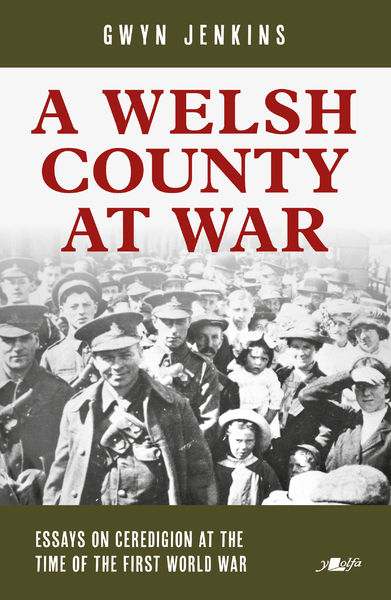Ceredigion and its people during the First World War
Most books on the First World War concentrate on the mud and blood of the battlefield but a new book, A Welsh County at War by Gwyn Jenkins, published this week by Y Lolfa (£9.99), offers a fresh perspective on the war and its effect on the county of Ceredigion. Rather than a military history of the horror in the trenches, the book is a social and cultural study of the impact of the Great War on the everyday lives, opinions and actions of those on the home front. In particular, it includes the response of certain individuals, both ordinary and extraordinary, to the pressures of war on their lives.
Author Gwyn Jenkins said:
“I didn’t want to record the history of the county chronologically, but rather examine the views and experiences of individuals and the community in general, in the hope that it would throw some light on the nature of society at that time. Although the detail relates to the Welsh county of Ceredigion, its relevance is much wider.”
The book portrays the experiences of some prominent figures, well known locally and nationally. Among these are Dr Hermann Ethé, a German staff member at the University of Wales, Aberystwyth, who was hounded out of the town in 1914; the prominent poet and academic T Gwynn Jones who opposed the war; and T E Nicholas, a trade union activist and a thorn in the flesh of the county’s establishment, who was also an outspoken pacifist.
The book provides a new perspective on the events surrounding the case of Dr Ethé, locating it as a part of the strong anti-German feeling which was rife across Britain at that time. The hostile treatment afforded to Ethé and his English wife was condemned by many, though praised by others.
Also described in the book is the background to another famous dramatic incident in Aberystwyth when, in October 1915, T Gwynn Jones walked out of a chapel service conducted by the Revd R J Rees in protest at the minister’s prayer for victory. Jones and Rees had been friends from before the war but held divergent views when war was declared in 1914. Whereas Jones wrote poems condemning warmongers, Rees was to be found on recruiting platforms throughout the county.
The socialist Independent minister T E Nicholas, known as Niclas y Glais, was a fierce critic of the Government and of the war itself. He was Ceredigion’s organiser for the No-Conscription Fellowship as well as helping many who wanted to register as Conscientious Objectors to complete the relevant forms. His activities are contrasted in the book with those of an officer from the south of the county who was eventually killed at the front.
Professor Paul O’Leary, who is Sir John Williams Professor of Welsh History at Aberystwyth University has
commented:
“The book reveals in illuminating and sometimes surprising detail the many different aspects of life in the county – civilian and military, urban and rural – in the years immediately before the outbreak of war and during the conflict itself. Meticulously researched and written in an accessible style, the book will be read profitably by anyone interested in how world events can change the lives of ordinary people.”
Gwyn Jenkins said:
“The book isn’t a military history. Although some soldiers appear, it is more about their relationship with ‘their people’ back home. There are no ‘heroes’ in this book – only men, women and children trying to come to terms with a horrific war which shaped and sometimes destroyed their lives.”
The fruit of detailed historical research in primary and secondary sources, the book shows the period from quite a different angle and covers topics such as patriotism and the effects of war on women and children. It also highlights the changing attitudes to the military before the war, particularly in the towns, army recruitment methods and differing responses of religious leaders and other members of the community.
Other topics examined include the allegations that farmers were ‘unpatriotic’ and guilty of profiteering, and also the pressure they faced to grow more crops and the methods used to achieve this; conscription and the processes and machinations of military service appeal tribunals in deciding the fate of eligible men of military age; family and school life; patriotism and pacifism; and how returning soldiers dealt with coming home.
The royalties from sales of A Welsh County at War will be donated to the Jubilee Storehouse, the food bank at Penparcau, Aberystwyth.
